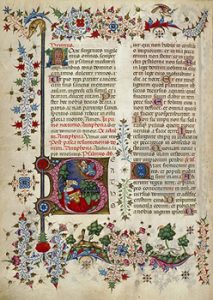 The Early Modern Book Project vise à mettre en relation des jeunes chercheurs travaillant de près ou de loin sur le livre à la fin du Moyen Âge et au début de l’époque moderne. Les chercheurs confirmés et les professionnels des métiers du livre sont bien sûr les bienvenus dans le projet. Prenant acte des frontières disciplinaires souvent très rigides et, parfois, de l’absence de communication, ce projet cherche à favoriser la circulation de l’information et le partage des compétences scientifiques et techniques dans le domaine du livre manuscrit et imprimé à un niveau international.
The Early Modern Book Project vise à mettre en relation des jeunes chercheurs travaillant de près ou de loin sur le livre à la fin du Moyen Âge et au début de l’époque moderne. Les chercheurs confirmés et les professionnels des métiers du livre sont bien sûr les bienvenus dans le projet. Prenant acte des frontières disciplinaires souvent très rigides et, parfois, de l’absence de communication, ce projet cherche à favoriser la circulation de l’information et le partage des compétences scientifiques et techniques dans le domaine du livre manuscrit et imprimé à un niveau international.
Pour ce faire, un site a été créé, https://embookproject.org/, qui s’articule autour de plusieurs axes :
- D’abord un « Who’s who» des jeunes chercheurs travaillant sur ce domaine. Le Member Directory est un moyen de retrouver facilement les personnes s’intéressant à un aspect spécifique du sujet.
- Le calendrier, ouvert à tous, permet de repérer les conférences, les appels à contribution et les offres de postes liés à l’histoire du livre.
- Le forum, réservé aux inscrits, est un espace d’échange informel, où il est possible de se tenir informé des nouvelles publications et de demander des conseils d’aide à la recherche : renseignements bibliographiques, traductions, transcriptions, identifications de provenances, d’éditions, de textes, d’images (entre autres).
- Un glossaire multilingue des termes liés à l’histoire du livre est également en cours de constitution.
Outre cette plate-forme en ligne, nous souhaitons organiser des rencontres et ateliers ouverts aux membres ainsi qu’aux autres chercheurs, où chacun pourra intervenir en fonction de ses centres d’intérêt.
- Des ateliers thématiques seront l’occasion pour les jeunes chercheurs de se former à des méthodes issues de toutes les disciplines liées à l’étude du livre ancien, qui peuvent leur être utiles dans leur recherche : par exemple la codicologie, la bibliographie matérielle, le catalogage, les instruments de recherche, l’analyse des textes et des images…
- Sur le long terme, des journées d’études et stages auprès de spécialistes du domaine sont également envisagées.
***
The Early Modern Book Project aims to put young scholars working on Late Medieval and Early Modern manuscripts and printed books in contact with each other. Senior scholars interested in the subject are of course welcome to join. To bypass the disciplinary boundaries within the Humanities and the lack of communication among institutions, we want to encourage the sharing of information and technical skills related to the study of manuscript and printed books at an international scale.
To that end, a website has been created, https://embookproject.org/, consisting of four parts:
- As a « who’s who » of young scholars working on the subject, the Member Directory is a mean to get in touch with people working on a specific aspect of the subject.
- A calendar, accessible to all, was designed to isolate information about the conferences, call for papers, and job offers related to book history.
- A forum, which is all about informal exchanges between the members – its access is therefore restricted. Here members can keep themselves up to date with recent publications and seek assistance from other members (bibliographical advices, translating or transcribing texts, identifying the past owners of copies, identifying editions, texts, images).
- A multilingual glossary is currently being developed.
Aside from this online platform, we wish to organize meetings and workshops open to members and other scholars, where people will be able to take part depending on their research interests.
- Thematic workshops will be set up to allow young scholars to learn more about the various methods used to study rare books. These skills would definitely be an asset to their research. For example codicology, material bibliography, cataloging, research tools, analyzing texts and images.
- In the future, we also wish to organize conferences and summer schools, with the help of experts in the field of book history.

Leave a Reply
You must be logged in to post a comment.